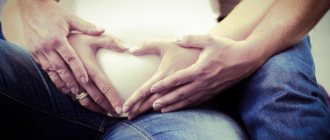What does the human brain do? This is home, family, work, other everyday and personal problems. And the center of a pregnant girl’s life becomes her tummy. After all, the future toddler lives and develops there. And any problems, ailments, abdominal cramps during pregnancy and other unpleasant sensations in this area immediately come to the fore.
It is unwise to ignore such symptoms. They may indicate various pathological processes that have a negative effect on both the unborn child and the life and health of the expectant mother.
Colic - what is it? Medical certificate
Colic is a pain attack in the abdominal area. Doctors distinguish several types of this pathology, each of which has its own distinctive features. The main symptom of colic is pain. It can be different - stabbing, cramping, acute, disturbing, moderate. These unpleasant symptoms occur spontaneously, but can bother a person constantly. Colic does not select the gender and age of the patient. The first acquaintance with this pathology begins in infancy.
Diagnostic methods for spasms and pain in the intestines
Frequent spasms of the intestinal muscles can signal a number of organic and functional disorders. This requires an integrated approach to diagnosis for a comprehensive assessment of the condition of the gastrointestinal tract. Based on the collected medical history, the following examination methods may be prescribed:
- laboratory tests of stool, including for dysbacteriosis;
- blood and urine tests (including pancreatic enzyme tests);
- Ultrasound of the abdominal cavity, liver, gall bladder;
- gastroduodenoscopy;
- colonoscopy.
Considering that intestinal pain and intestinal colic can “mask” diseases of other abdominal and pelvic organs, consultations with other specialists are recommended. Thus, an examination by a gynecologist for women can exclude pathologies of the reproductive organs, and a consultation with a urologist can exclude kidney disease.
Where can you expect trouble?
If colic occurs during pregnancy, you should immediately consult a doctor.
Waiting for a baby is accompanied by increased stress on all body systems. Types of colic in pregnant women:
- Hormonal – during the restructuring of the body to support pregnancy
- When an embryo is implanted in the uterine cavity
- Renal
- Hepatic
- In the groin and vagina
- Intestines
- Physiological processes associated with an increase in the size of the uterus
Whatever the reason for the development of colic, this is a reason to contact a gynecologist and undergo an examination.
Hormonal colic in pregnant women
Hormonal colic occurs due to relaxation of the intestinal muscles.
After conception, a woman’s body begins to produce hormones aimed at maintaining pregnancy. This is human chorionic gonadotropin, free estriol, estradiol. They cause some confusion in all body systems, but these substances do not cause colic.
Progesterone is to blame for the discomfort. This hormone is constantly produced in a woman’s body. In a non-pregnant state, it is responsible for the normal course of menstruation. When conception occurs, its task is to prevent abortion.
To do this, the body has to produce it in larger volumes than usual. A side effect of progesterone is relaxation of the intestinal muscles. This causes congestion, constipation and colic in the pregnant woman.
Renal colic and pregnancy
Renal colic occurs when the ureters are blocked by various stones - stones or sand. During pregnancy, the load on the urinary system increases and immunity decreases. This may cause rocks or sand to move. Symptoms of renal colic:
Gynecologist about abdominal pain during pregnancy. Everything the patient needs to know
The leading gynecologist of the clinic, Personal Doctor Tatyana Valerievna Imidoeva, answers patients’ questions.
It should be noted right away that pain is usually a signal that is sent by the body to the cerebral cortex to report that there is some kind of problem in your body. Therefore, if there is the slightest doubt, a pregnant woman should immediately contact a gynecologist at the Personal Doctor clinic. Our clinic operates a pain treatment center. It brings together doctors from different specialties who work as a team and help patients get rid of pain by eliminating its causes.
We have extensive experience working with pregnant patients at different stages.
Therefore, a vital rule for a pregnant woman: “If you are worried about abdominal pain during pregnancy, if you have any doubts, immediately contact the gynecologists of the Personal Doctor clinic...” Our doctors will perform the necessary examinations, ultrasounds, tests and will clearly identify the causes of the pain, as well as professionally assess the risks for the expectant mother and fetus
WHAT PAIN IS NORMAL DURING PREGNANCY?
One of the most common acute pains women report is a stabbing pain in the uterus, abdomen, or groin area. Although this may be uncomfortable, in many cases it can be explained by the normal changes that occur during pregnancy.
IS IT NORMAL TO HAVE ABDOMINAL PAIN IN EARLY PREGNANCY?
In most cases, mild abdominal cramps are a normal part of early pregnancy. They are usually associated with normal physical changes that your body goes through as it prepares to carry your baby. Some women experience colic with slight bleeding as the embryo implants into the wall of the uterus.
WHAT CAUSES ABDOMINAL PAIN IN EARLY PREGNANCY?
About a week after ovulation, some women experience cramping in the lower abdomen, known as “implantation cramps,” due to the recent implantation of a fertilized egg into the uterine wall. Women may also experience abdominal cramps in the early weeks of pregnancy due to the stretching and growth of the uterus.
IS IT NORMAL TO FEEL ACUTE PAIN IN EARLY PREGNANCY?
Some common reasons include:
Colic – You may experience severe pain due to colic that occurs when the uterus dilates.
Gas and bloating.
Round ligament pain - may occur in the second trimester and may cause sharp abdominal pain on both sides.
IS ACUTE PAIN NORMAL IN THE 6TH WEEK OF PREGNANCY?
Although these cramps are a normal part of pregnancy, you should contact your doctor during the first trimester if you experience any of the following symptoms:
Cramping occurs after the first 6 weeks but before the 12th week. You experience severe pain accompanied by bleeding.
IS IT NORMAL TO HAVE ACUTE PAIN IN THE 7TH WEEK OF PREGNANCY?
Symptoms of pregnancy at seven weeks. Although mild colic is normal during pregnancy, talk to your gynecologist if you are concerned, ESPECIALLY IF YOU ARE BLEEDING. Unfortunately, BLEEDING AND ABDOMINAL PAIN CAN BE SIGNS OF EARLY MISTARRIAGE.
IS DAILY COLIC IN EARLY PREGNANCY NORMAL?
Normal cramping pain in early pregnancy. During the first trimester, your body prepares for your growing baby. These changes may cause spasms that would be considered normal. Cramping pain may also occur during exercise, indicating that you need some rest, or after sex and orgasm.
IS SPASTIC PAIN IN EARLY PREGNANCY A NORMAL SIGN?
Cramps in early pregnancy.
The good news is that cramping without bleeding is usually not a sign of miscarriage. Cramping or short-term pain in the lower abdomen may occur early in a normal pregnancy as the uterus adjusts to the implanted fetus. These pains may be weak and brief.
Dear patients, do not forget: with the onset of pregnancy, you bear double responsibility for your life and the life of your unborn baby.
Therefore, entrust your health to the hands of professionals with international experience. Contact the clinic with your personal doctor by phone or make an appointment through the website (24/7). You can also sign up for a paid consultation with our gynecologists via Skype (SKYPE) to quickly consult with a specialist before visiting the clinic.
Sign up, call, ask questions on Skype! We are waiting to help you in difficult times!
The cost of an initial consultation with an experienced gynecologist of the highest category with an international GCP certificate is only 1800 rubles (1500 rubles if you pay with a bank card right now through the website...)
Pay for a doctor’s appointment right now on the website with a bank card and get a 300 ruble discount!
Ultrasound of the pelvic organs 1700 rubles
pregnancy test (blood) 580 rubles
see full price list
For any questions, call us and make an appointment with a gynecologist!
Appointment with examination and recommendations from a doctor of the highest category
only 1800 rubles!
We have no hidden fees! Call!
| E single number: 426-15-05 | ||
| St. Petersburg, Bolshevikov Ave., building 30, bldg. 2 (Nevsky district, metro station "Ul. Dybenko") | ||
| St. Petersburg, Kolpino, st. Communes building 23, m. Kupchino | ||
Preventive actions
The following tips will help reduce the likelihood of developing colic during pregnancy:
- Follow doctor's recommendations
- Watch your diet
- Visit a gynecologist regularly
- Have a good rest
- Competently treat diseases of the urinary and digestive systems
During pregnancy, it is better to be safe than to bite your elbows later. If unpleasant symptoms occur, immediately consult a doctor and undergo a course of treatment.
Treatment of intestines for spasms and pain
What to do with intestinal colic in the abdomen, the doctor decides based on the results of the examination, medical history, taking into account the age and general health of the patient - treatment for an adult and a child can differ significantly.
During therapy the following directions can be used:
- drug treatment aimed at eliminating symptoms, normalizing the balance of microflora and intestinal motility, restoring the enzymatic function of the pancreas and other disorders identified during the examination;
- surgical treatment in cases where the patient has structural changes in the large or small intestine, multiple polyps or other neoplasms that interfere with the normal functioning of the organ;
- diet therapy, the purpose of which is to facilitate the work of the intestines as much as possible for its speedy recovery and eliminate factors leading to irritation of its walls.
The treatment package is selected exclusively individually, taking into account the causes and complications of the disease, as well as its clinical manifestations. Therefore, specialists of a narrow profile - a gynecologist, urologist, endocrinologist - can take part in the formation of a therapy program. If intestinal spasms due to nerves are detected, treatment includes consultations with a clinical psychologist, and in case of intestinal innervation disorders, a neurologist.
What can be confused with
Intestinal colic, which appears in a pregnant woman, is similar in clinical manifestations to other pathologies in some respects, but differs in its course.
We recommend: The most effective folk remedies for the treatment of intestinal colitis
Intestinal spasms in a woman carrying a child can be confused with the following processes:
- urinary system disease;
- placental abruption;
- inflammation of the appendages;
- appendicitis;
- threatened miscarriage or premature birth;
- intestinal obstruction;
- helminthiasis
Also, similar symptoms can be caused by gastrointestinal diseases , in which pain is the leading syndrome. These include:
- gastritis with high acidity;
- peptic ulcer;
- hepatic colic, causing intestinal spasms;
- renal colic;
- dysbacteriosis;
- intestinal infections of various etiologies.
Any of these pathologies is accompanied by abdominal pain , which can be of varying intensity and duration. Comprehensive diagnostics, including medical history, laboratory and instrumental examination methods, will help differentiate and correctly diagnose the pathological process in a pregnant woman.
Types of intestinal spasms
Intestinal spasms can be functional or pathological .
The appearance of colic during pregnancy is their functional type, since this syndrome disappears in the postpartum period. In case of pathological intestinal spasm, its cause is chronic pathology of internal organs, which after treatment can give a stable remission. But under unfavorable conditions, an exacerbation can be provoked, which can be repeated many times. The condition improves only with active treatment of the underlying disease.
Treatment methods
The use of medications during pregnancy is strictly limited . Only a specialist can decide on the prescription of drugs, taking into account the course of intestinal spasm and the general condition of the pregnant woman.
If the pain syndrome is mild , the doctor may prescribe a “No-shpa” tablet to relieve spasm of smooth muscles. This drug does not have a negative effect on the child.
Sometimes the attack stops on its own when the pregnant woman relaxes and takes a horizontal position. Medicinal herbs have a good effect in stopping colic attacks , such as:
- peppermint;
- Melissa;
- valerian root;
- fennel and dill seeds.
We recommend: What is intestinal dolichosigma and how to treat it
Pregnant women can make and use decoctions or infusions from plant materials only on the recommendation of a doctor. If an attack of intestinal colic occurs with severe pain, you must call an ambulance. The doctor will determine further actions for the pregnant woman.
Important! Independent use of a heating pad at home during intestinal spasms is strictly contraindicated: the thermal procedure can additionally provoke an increase in uterine tone.
What to do
If a stabbing pain is felt, then first of all the pregnant woman needs to relax and calm down, change her body position. If possible, you should lie down or massage your lower back. If even after rest the discomfort continues, but there are no other symptoms of pathology (discharge, fever, weakness, dizziness, nausea or vomiting), then you can take a medicine that relieves vasospasm (Drotaverine, No-Shpa) or take a warm shower.
If the pain increases, or additional signs of pathology appear, then you need to seek medical help. If vomiting, nausea, stool problems, or fever occur, you should call an ambulance. In order not to blur the clinical picture, you should not take antispasmodics or painkillers, drink or eat until examined by a doctor.
In women suffering from constipation and decreased peristalsis, the risk of developing pathology during pregnancy is several times higher
In case of hepatic or biliary colic, the pain will be somewhat reduced by a warm heating pad; if the pain is caused by cholecystitis, then cold should be applied. If the lower abdomen hurts from time to time, then you need to understand what causes the pain. The cause may be stress, errors in diet, consumption of foods that increase gas formation, or staying in one position for a long time.
In any case, any unpleasant sensations should be reported to the doctor observing the pregnancy. After the necessary research, pathology will be excluded, and the expectant mother will stop worrying. To minimize the likelihood of abdominal pain, a pregnant woman should eat right, drink enough fluids, spend plenty of time outdoors and lead a moderately active lifestyle.
Symptoms of intestinal spasms in pregnant women
The appearance of intestinal spasms is always pronounced and has its own characteristics . Colic is not an independent disease, but is only a symptom provoked by a disruption in the functioning of internal organs.
Intestinal spasm caused by various reasons leads to the development of clinical symptoms . Most often it develops 1.5-2 hours after eating. At the very beginning of the attack, there may be discomfort in the navel area in the form of minor pulling or pressing pain.
Active movements and the act of defecation provoke increased pain. Tension of the colon muscles causes colic, accompanied by the following symptoms :
- bloating;
- heaviness and feeling of fullness in the stomach;
- increased gas formation;
- nausea, vomiting;
- decreased appetite;
- bowel dysfunction: diarrhea or constipation.
Intestinal cramps are periodic and can recur throughout pregnancy.









